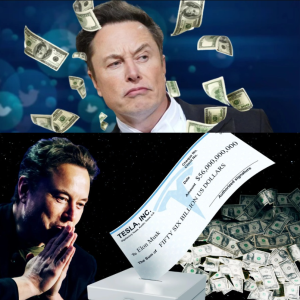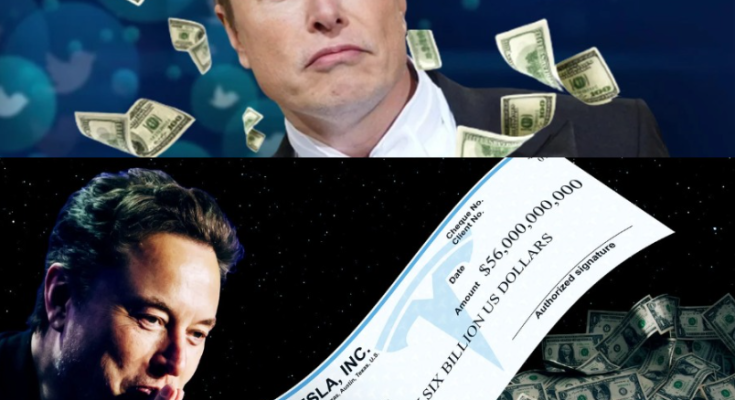Elon Musk’s Unbelievable Power: How $24 Billion in Bonuses Outpaced Tesla’s Net Profit Over Two Years
Elon Musk, the enigmatic billionaire entrepreneur known for his groundbreaking ventures with Tesla, SpaceX, and more, has once again sparked widespread discussion—this time about the staggering size of his compensation package. Recent reports revealed that Musk received bonuses totaling an eye-popping $24 billion, an amount larger than Tesla’s combined net profits over the past two years. This revelation has ignited debates over executive pay, corporate governance, and the dynamics of wealth concentration in the modern era.
A Compensation Package Like No Other
Elon Musk’s compensation is famously tied to a performance-based stock option plan approved by Tesla’s board in 2018. Unlike traditional CEO salaries, Musk’s package is structured to reward him only if Tesla hits ambitious market capitalization and operational milestones. The design was meant to align his incentives with shareholders, encouraging him to grow the company’s value significantly.
Fast forward to today, and Musk has unlocked vast tranches of stock options worth approximately $24 billion as Tesla achieved these challenging benchmarks. This sum dwarfs typical CEO paychecks and stands as one of the largest compensation packages in corporate history.
What makes this figure even more remarkable is how it compares to Tesla’s overall financial performance. Over the past two years, Tesla’s net profits combined have been significantly less than Musk’s bonus haul. While the company’s net income reached record levels, Musk’s personal gain has outpaced the collective earnings of the entire corporation.
Understanding Tesla’s Profits vs. Musk’s Bonuses
Tesla’s net profit, the money left after all expenses, taxes, and costs, reflects the company’s ability to generate sustainable earnings from its operations. These profits have indeed grown impressively, reflecting Tesla’s dominance in the electric vehicle market and its expanding global footprint.
However, the $24 billion figure refers to stock options granted to Musk, which represent potential earnings based on Tesla’s share price and market capitalization milestones. These are not guaranteed cash payments but rather the ability to buy shares at a set price, which Musk can sell for profit if Tesla’s stock continues to perform well.
Still, the sheer size of the bonuses relative to Tesla’s net profits raises questions about the balance between executive reward and company performance. It highlights how CEO compensation, particularly in tech and innovation-driven companies, often includes vast sums linked to stock market valuations rather than traditional salary models.
Public and Investor Reactions
The news of Musk’s $24 billion bonuses has drawn mixed reactions. Supporters argue that Musk’s vision, risk-taking, and leadership have revolutionized the automotive industry, accelerated the adoption of sustainable energy, and justified the rewards he receives. They point out that Tesla’s success owes much to Musk’s ability to inspire innovation, disrupt markets, and push boundaries that others thought impossible.
Critics, however, see the compensation as emblematic of growing economic inequality and excessive executive pay. They argue that such massive payouts, especially when outpacing company profits, can alienate employees, investors, and the public. Some question whether the structure incentivizes short-term stock price boosts over long-term company health.
Wall Street analysts and shareholder groups have also weighed in, debating the merits of Musk’s pay plan. While some praise the alignment of incentives, others caution that it could create perverse motivations, encouraging stock manipulation or risky strategies to hit compensation targets.
The Broader Debate on Executive Compensation
Musk’s case is part of a larger conversation about CEO pay in America and globally. Executive compensation has ballooned over the past few decades, with CEOs earning hundreds of times the average worker’s salary. This disparity has sparked discussions on fairness, corporate responsibility, and the impact on company culture.
Tesla’s approach to Musk’s pay—tying rewards to specific milestones rather than fixed salaries—is often cited as innovative. Yet, the unprecedented scale of the bonuses raises concerns about the limits of such models and the accountability mechanisms needed to ensure shareholder interests are protected.
Some advocate for stricter regulation, greater transparency, and more shareholder say in executive compensation packages. Others call for cultural shifts within corporations to balance visionary leadership with equitable wealth distribution.
How Musk’s Bonuses Reflect His Unique Role
Elon Musk’s influence extends beyond Tesla. As the driving force behind SpaceX’s ambitious space exploration goals, Neuralink’s brain-computer interface projects, and The Boring Company’s infrastructure initiatives, Musk is widely seen as a singular figure shaping multiple industries simultaneously.
His compensation, therefore, is often framed as reflecting not just Tesla’s achievements but his broader impact on technology and society. Investors who back Musk’s vision often do so believing in his potential to create long-term value far beyond immediate financial metrics.
Moreover, Musk’s personal style—eschewing a traditional salary and taking on immense personal financial risk—sets him apart from many corporate leaders. His compensation is almost entirely stock-based, meaning his wealth fluctuates with Tesla’s market value and performance.
Looking Ahead: Implications for Tesla and Corporate America
The disclosure of Musk’s $24 billion bonuses has put Tesla and corporate compensation practices under the spotlight. For Tesla, it raises questions about future governance and how the company will continue to balance rewarding innovation with managing investor expectations and employee morale.
For corporate America, Musk’s case serves as a high-profile example illustrating the tensions between visionary leadership and economic equity. It challenges boards and shareholders to rethink how best to incentivize CEOs while ensuring sustainable, inclusive growth.
The debate also fuels ongoing conversations about wealth concentration, taxation, and the social responsibilities of the ultra-rich. As public scrutiny of billionaire fortunes intensifies, Musk’s compensation package becomes part of a broader discourse on economic justice and corporate ethics.
Conclusion
Elon Musk’s $24 billion bonuses highlight the incredible financial rewards possible in today’s corporate landscape, especially for visionary leaders who reshape industries. While Tesla’s success is undeniable, the gap between Musk’s compensation and the company’s net profits invites reflection on executive pay structures and their societal impact.
As Tesla continues to innovate and expand, and as Musk pursues ambitious goals beyond electric vehicles, the world will watch closely how compensation, corporate governance, and leadership evolve. The conversation sparked by Musk’s unprecedented bonuses is far from over, touching on fundamental questions about wealth, power, and the future of capitalism.


